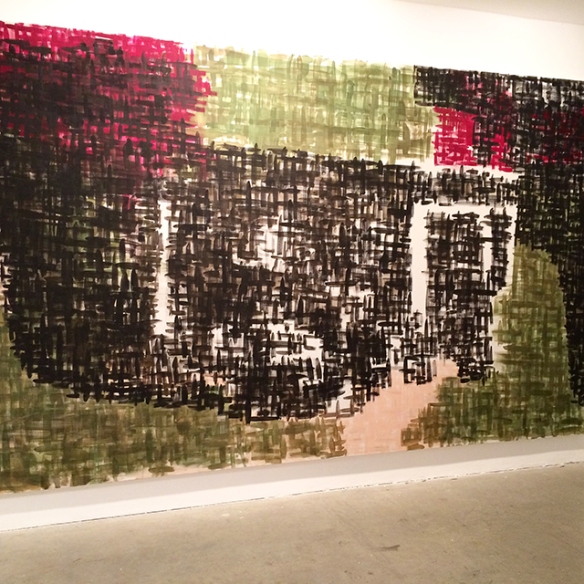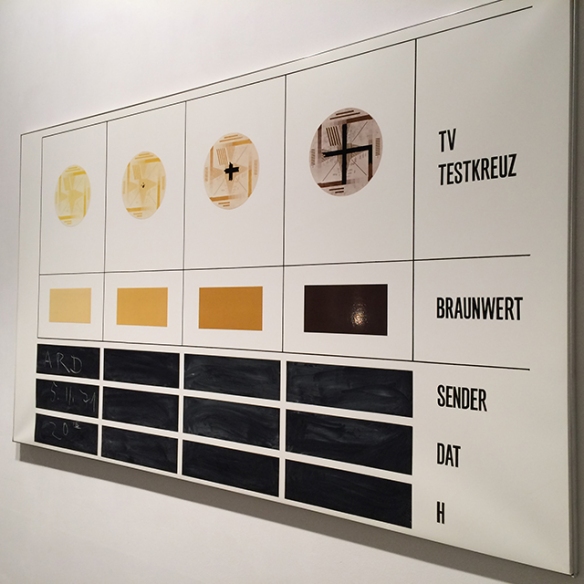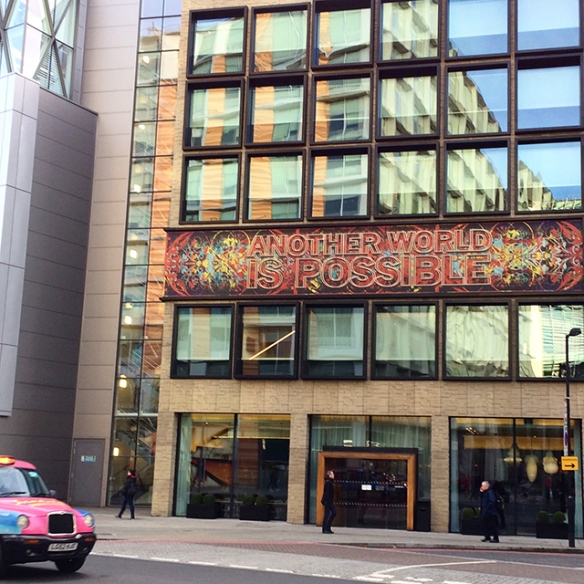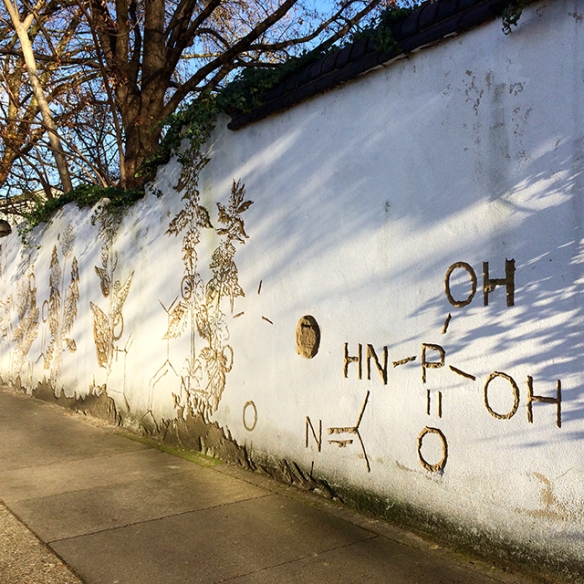The day begins with a jog up to White Cube Gallery in Mason’s Yard. Minjung Kim has used traditional Korean craft techniques to lay down layers of ultra-thin mulberry tree paper into rhythmic compositions. The paper has many uses outside of art in the artist’s native country including as window panes, due to its strength even in thin layers allowing light to diffuse between the various natural fibres. Downstairs, the artworks are vividly coloured. The paper has been dyed and applied in layers, with each piece burnt along one edge in a ritualistic gesture by the artist, one that we are told is accompanied by the smell of incense and a discipline of complete silence. The overall effect on the artworks is to create textured regions of intense colour reminiscent of flowers and natural vegetation.
In Sprueth and Magers just across Piccadilly, Anthony McCall is displaying a light installation. His use of a smoke-like mist in these light-works, allows the experience to be a 3D one rather than just the conveyance of an image from one flat medium, a digital Jpeg in a projector, to a screen on the far wall. Yes, the screen is still present as the final destination for the image, but the light wends its way through wisps of smoke, like in those cigarette-friendly cinemas of one’s youth, catching the little eddies of particles on the way, creating straight shimmering beams of light across the room. The image itself is simple enough, a single line that is curved into an ellipse, sometimes perfectly rounded, sometimes dislocated into a stepped join between end and beginning, but the transition between the two is captivating as the digital projector slowly cycles from the one to the other.
At Grosvenor Hill a few hundred metres further on, is the Gagosian Gallery. A burst of applause echoes from within the furthest room. Glenn Brown had given me a great tutorial twenty years ago and he is instantly recognisable as the same chap. With his address to a group of visitors in the background and my own sketchy knowledge of some of his main artistic concerns gleaned during that generous four hour tutorial, the work on display takes on an extra depth. The painting is ultra flat as many of us would be familiar with, whilst the waxy trails of paint from the historical canon he explores, are simulated with intricate brushwork. These labour intensive works used to net the artist just a couple of pounds an hour, a fact which he presented as a footnote to the precarious business of being an artist, during the aforementioned tutorial. It was interesting to hear from this address that whilst the paintings are still labour intensive, twenty years later, the intricate sketching style of some of the accompanying drawings is actually very quick to execute. Here, expertise of his medium appears to have allowed the artist to bend some of those time constraints of the beautiful painted works, and create an image that takes on the same rapid fluidity as those very lines he has imitated.
A second major gallery sits just round the corner and is the home of Almine Rech. Gunther Forg has several large photographs on display of variously imposing buildings. These are neo-classical in style and each is emblazoned with a title depicting the particular institution it houses. Whilst the titles such as GEOLOGIA and MUSICA are true to the original photographs, rendered in various block capitals in concrete or metal, and sitting above the grand entranceways, they nevertheless form a more extended and general index of knowledge, one which is familiar to us from library shelves and TV documentaries. Meanwhile, the buildings have a grand scale themselves, both in their photographic representation and in their actual physical size. Presented together along one wall, the images appear monumental and we get that rare sense of an illusionistic space that is actually bigger than the expansive gallery it has been presented in.

Minjung Kim at White Cube who makes images from thin layers of mulberry tree paper.

Tonico Lemos Auad of Stephen Friedman.

Bjarne Melgaard of Galerie Thaddaeus Ropac with recently finished work that fills the room with an aroma of linseed oil and paint from their drying surfaces.
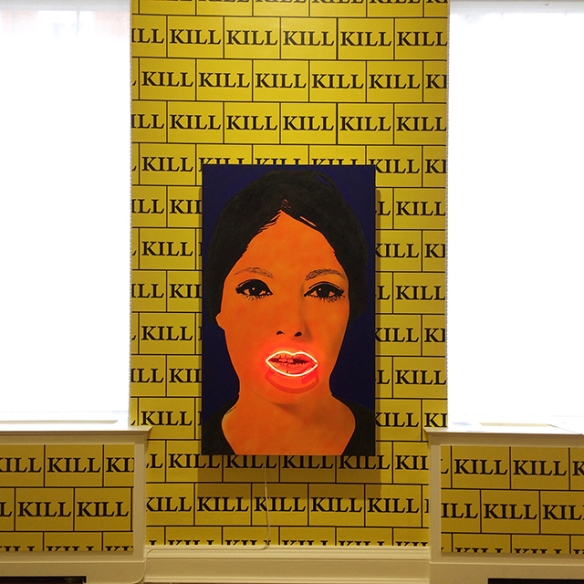
Sturtevant at Galerie Thaddaeus Ropac.

Anthony McCall at Sprueth Magers with slowly moving light projections, which uses a smoke-like substance in addition to a screen, to capture the image. The public are encouraged to move through the space and disrupt the image.

Bosco Sodi of Blain Southern with a piece at Philips.
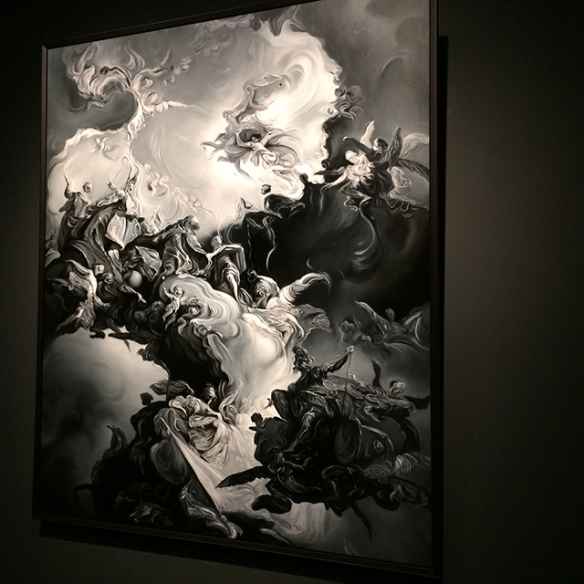
Glenn Brown of Gagosian showing paintings where the brush marks of oil paint are simulated with a flat almost photographic surface.

Gunther Forg of Almine Rech.

Sculptures on Grosvenor Hill.



